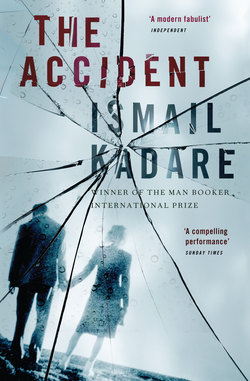Читать книгу The Accident - Ismail Kadare - Страница 7
На сайте Литреса книга снята с продажи.
Оглавление3
Three months later, the archivist could not hide his astonishment when the governments of two Balkan countries, one after another, asked to inspect the file on the accident at kilometre marker 17. How could the states of this quarrelsome peninsula, after committing every possible abomination known to this world – murdering, bombing, setting entire populations at each other’s throats and then deporting them – find the time, now that the madness was over, instead of making reparations, to enter into such minor matters as unusual car accidents?
There was no way of knowing why the state of Serbia and Montenegro should take an interest in the accident, but it soon became clear that this country had kept the two victims under surveillance for a long time.
The discovery of this connection was enough to spark the Albanian secret service into action too. Suspicions of a political murder, the kind of allegation fashionable to ridicule, since the fall of communism, as a typical symptom of communist paranoia, suddenly revived in grim earnest.
As usual, the Albanian intelligence officers took a long time to reach a position which the others had already abandoned. However, through contacts with their compatriots in the Albanian communities abroad, they managed to assemble a good deal of material relating to the victims. There were parts of letters, photographs, airline tickets, hotel addresses and bills, which, although only the first fruits of their harvest, provided a mass of information about the couple. The photographs, taken mainly in hotels, at pavement cafés, and a few in a bath, out of which the young woman, naked, stared at the camera with more elation than shame, left the nature of their relationship in no doubt. The hotel bills were clear evidence that they had met in different European cities, where this woman’s friend had happened to go for his work: Strasbourg, Vienna, Rome, Luxembourg.
The photographs confirmed the locations, and the cities were also mentioned in letters, mainly written by the young woman, who liked deciding in which of them she had felt happiest.
The intelligence officers placed their main hope of solving the riddle in these letters, but after reading them they were at first disappointed, then disoriented and finally totally bewildered.
The blatant contradictions led them to interrupt their investigations to interview hotel receptionists, chambermaids, waiters in late-night bars, a girlfriend of the woman, called Shpresa, an Albanian living in Switzerland who the letters stated “knew the truth” and, finally, the taxi driver.
Their testimonies more or less coincided: usually when they met, the couple seemed cheerful, but on occasion the woman had appeared despondent, and once had been seen silently weeping while he had gone out to make a phone call. He too had sometimes looked sad, and then she would try to comfort him, stroking and kissing his hand.
The interviewers put the question: was something on their minds … a decision they had to take but couldn’t, some regret, uncertainty, threat? The waiters could not answer this. To their eyes it all seemed normal. Most couples in late-night bars passed from ebullience to silence, and sometimes dejection, and then suddenly brightened up again.
The woman became very beautiful at these times. Her eyes, which until then had idly followed her cigarette smoke, lit up with emotion. Her cheeks too. She acquired an alarming, devastating charm.
Devastating? What could that mean?
“I don’t know how to explain it. I was trying to say the kind of beauty that knocks you flat, as people say. The man also seemed to revive, and would order another whisky. Then they would talk again in their own language until after midnight, and stand up to go upstairs to their room.
“From the way she rose to her feet with a sidelong glance and walked in front with her head slightly bowed, an old-fashioned picture of a beautiful, transgressing woman, you could tell that they were going to make love. These things provide late-night barmen with entertainment, especially at the end of their long hotel shifts.”
